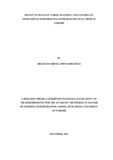| dc.description.abstract | Manufacturing Planning and Control systems enhance the achievement of all activities undertaken in a manufacturing firm, whose operations’ success lies with well-established planning and control systems .The studies done earlier failed to cover implementation and adoption of these MPC systems in pharmaceutical firms and their effects on their operational performance. The specific objectives of this study were therefore to find out the extent of the implementation of the MPC systems in the pharmaceutical firms, find out the challenges they faced the benefits of implementation and determine the relationship between the MPC system and their operational performance. Descriptive research design was used in the study. The study population was all the 28 registered pharmaceutical manufacturing firms in Nairobi, targeting the respondents from finance, quality and operations or production departments. Questionnaires were used as instruments for data collection. Descriptive statistics such as frequencies, means, percentages and standard deviations were used. Inferential statistics such as regression and correlation analysis was used to analyze the relationship between the study variables. The study found that different aspects of manufacturing planning control systems were adopted and implemented by the firms studied. Manufacturing resource planning systems were adopted and implemented by the organizations to the greater extent (Average mean 4.05), Enterprise resource planning (3.97), Just-In-Time (3.88) and Material requirement planning system(3.83).Benefits of the implementation of MPC systems included reduction in cases of stock outs and easy monitoring of processes from all departments among others while communication barrier, insufficient utilization of labour, resistance to change, seasonal/unstable market for commodities, lack of qualified personnel, inadequate resources, prolonged decision making processes, untimely delivery of raw materials and unreliability of suppliers of materials were the challenges identified by the study. The regression analysis established that Materials Requirement Planning, Manufacturing Resource Planning, Enterprise Resource Planning and Just-in-time systems had an impact on operational performance of pharmaceutical firms in Nairobi. The study recommended that pharmaceutical firms should come up with other strategies of countering the challenges facing adoption and implementation of manufacturing planning and control systems. The main limitation to the study was the time constraint in data collection and trying to beat the deadline for project submission. The study recommended another study be done specifically of the challenges facing the adoption and implementation of manufacturing panning and controls systems in organizations which was not the main focus of this study. This study was done on the impact of manufacturing planning and control systems on pharmaceutical firms in Nairobi, the same study can be done for the same industry for the whole country and better still for another country. | en_US |



